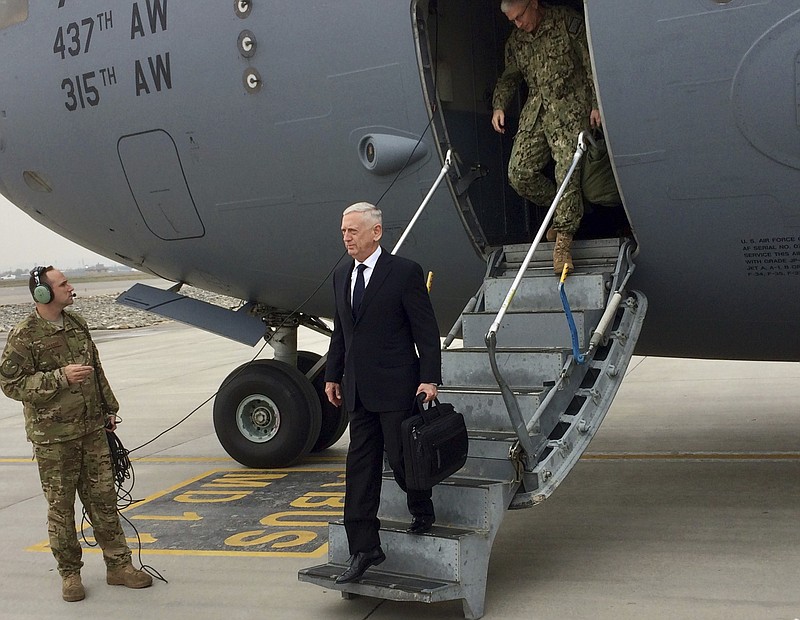KABUL, Afghanistan (AP) — U.S. Defense Secretary Jim Mattis said Tuesday he believes victory in Afghanistan is still possible — not necessarily on the battlefield but in facilitating a Taliban reconciliation with the Afghan government.
Mattis spoke shortly before arriving in Kabul, where security concerns were so high reporters traveling with him were not allowed to publish stories until his party had moved from the Kabul airport to the U.S.-led military coalition’s headquarters. That was the first such restriction on coverage of a Pentagon chief’s visit in memory.
Mattis said he would be meeting with President Ashraf Ghani and top U.S. commanders.
“We do look toward a victory in Afghanistan,” he said, adding, “Not a military victory — the victory will be a political reconciliation” with the Taliban, which has achieved a stalemate in recent years and shown little interest in conceding to the Kabul government.
Mattis, a retired Marine general who commanded U.S. troops in southern Afghanistan in the opening weeks of the war in 2001, said getting the Taliban to reconcile en masse may be “a bridge too far.” So the emphasis is on drawing in Taliban elements piecemeal.
He described this approach as an effort to “start peeling off those who are tired of fighting,” after more than 16 years of war.
“We know there is interest on the Taliban side,” he said.
He defined victory in Afghanistan as a political settlement between the Taliban and the government, and an Afghan military capable of securing the country largely on its own. At that point, he said, Afghanistan would not be “a haven for attacks internationally” as it was when al-Qaida used the country as a launching pad for the attacks of Sept. 11, 2001.
Ghani opened his meeting with Mattis at the Presidential Palace by expressing appreciation for the U.S. military’s sacrifices over the years, and offering praise for the new war strategy approved by U.S. President Donald Trump last August.
Ghani called the new U.S. approach a “game changer.”
“It has forced every actor to re-examine their assumptions,” he said, adding in the short run this could intensify the conflict. On the positive side, he said, it enables his government to make an unconditional peace offer to the Taliban without it looking like a surrender. He said it also allowed his government to approach Pakistan with an offer of a “comprehensive dialogue.”
U.S. intelligence officials are predicting the war will remain stalemated as the traditionally most intensive fighting season begins this spring.
The visit is Mattis’ second since Trump announced last August, despite his instinct to pull U.S. troops out of Afghanistan, his administration would take a more aggressive approach to the conflict, now in its 17th year.
As part of an effort to bolster Afghan fighting strength, the U.S. in recent weeks sent an Army group of about 800 soldiers, accompanied by several hundred support troops, to advise the Afghans closer to the front lines. The U.S. also shifted A-10 attack planes and other aircraft from striking Islamic State militants in Syria and Iraq to Afghanistan as part of Trump’s new approach. These and other moves boosted the number of U.S. troops in Afghanistan by at least 3,500 to a total of more than 14,000.
Mattis said the U.S. goal is to enable Afghan forces to weaken the Taliban to the point where the Afghans can manage their own security. Put another way, the aim is to convince the insurgents they cannot win on the battlefield, thus driving them to reconcile with the Afghan government.

